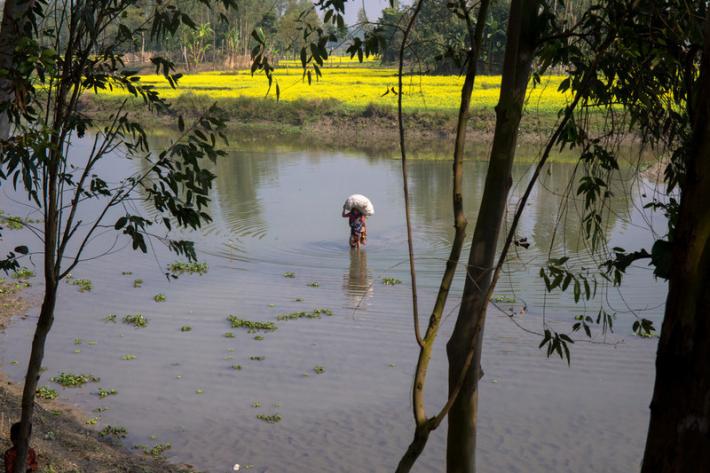October 2015 to July 2018 – Improving the Quality and Availability of Reproductive Health in Disasters in Belkuchi Upazila, Bangladesh
The world is facing stronger and longer disasters, protracted complex emergencies, conflicts and epidemics. These humanitarian crises can expose weakness in health systems, with particularly serious consequences for women and girls in need of reproductive health care.
To improve the quality and availability of post‑abortion care during a flood, the University of Leicester and International Planned Parenthood Federation South Asia Region (IPPF‑SAR), in collaboration with the Government of Bangladesh, developed and measured the impact of an integrated intervention package called RHCC. RHCC was first tested in the flood-prone locale of Belkuchi in Bangladesh. The RHCC has three components: i) pre‑positioning UNFPA’s Inter‑Agency Reproductive Health Kit 8 prior to flooding; ii) Capacity building of health workers; and iii) Community awareness raising. This intervention, the first of its kind, introduced the Reproductive Health Kit 8 in three primary health care facilities in Belkuchi during the 2017 flood. The Kit is used during disasters to manage miscarriage and post-abortion care, and consists of: i) medicines (e.g. oxytocin), ii) renewable medical supplies, iii) stationary and treatment guidelines, and iv) medical equipment (manual vacuum aspiration set) (UNFPA, 2011). The components of the Kit (i-iv) are available in Bangladesh due to the national family planning programme on menstrual regulation and post-abortion care. The novelty of the Kit is that the components are assembled in one package and ready to be used during disasters. The Kit has never been used in Bangladesh before, as such this intervention is novel.
RHCC demonstrated an increase in skilled management for the trained Nurses and Family Welfare Visitors; improved quality of life for clients of the Kits; and changed practices in the delivery of the Government of Bangladesh’s national family planning programme on menstrual regulation and post-abortion care in Belkuchi.
The research team has developed an evidence-based behaviour change communication (BCC) poster on post-abortion complications and two complementary tools to implement UNFPA’s guidelines on the RH Kit 8. This includes: a) structured assessment tool to assess the capacity of a healthcare facility to host the RH Kit 8; b) two‑step checklist tool, based on ‘essentials and desirables’ to expedite the process of assessing whether a facility is suitable for the RH Kit 8 in emergencies and disasters. This tool can act as guidance for setting up a facility where they are lacking. RHCC and the two tools can be applied to disaster across the globe.
The research project, which ran from 15 October 2015 to 31 March 2018, was funded by IPPF’s Innovation Programme and IPPF‑SAR’s SPRINT Initiative. The research component was led by the University of Leicester and the implementation component was led by IPPF‑SAR.
For more information on the project, please check out the project’s website, blog, Facebook page, film, the Policy Brief on improving the quality of post-abortion care, the Policy Brief on the RHCC Approach and the project’s Final Report.

